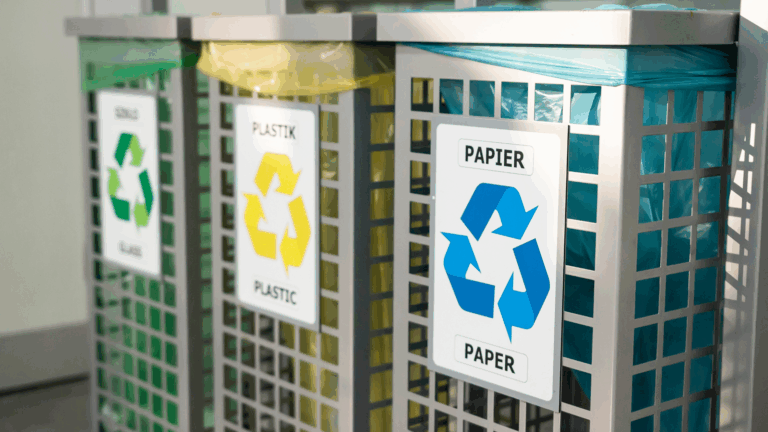
An informed business is a more effective one when it comes to waste management
Most of us don’t think much about the waste we produce. We make the effort to recycle and reuse where possible, but it’s easy for waste management to fall down the list of business priorities.
However, effective waste management is essential for any modern business. It can help to reduce costs, achieve compliance and meet the ethical standards that customers have come to expect from organisations. And when it comes to mastering waste management, knowledge is power.
The lifecycle of commercial waste is a critical process that every business should understand. This knowledge not only helps in meeting legal obligations but also contributes to environmental sustainability. We’re going to take a look at each stage of this lifecycle, from collection to processing.
Waste generation and segregation
The journey of commercial waste begins at the point of generation – within the business premises. It’s essential for businesses to effectively segregate waste at the source. Different types of waste – like organic, recyclable materials, and hazardous waste – require separate handling. This segregation not only complies with the UK’s waste management regulations but also facilitates more efficient recycling and disposal.
Waste collection
Waste collection is managed both by local councils and private waste management companies. Businesses need to arrange for regular waste collection services. Depending on the type of waste and the location of the business, the frequency and nature of these services can vary. It’s crucial to choose a licensed waste carrier to ensure compliance with the Environmental Protection Act 1990.
Transportation to processing facilities
Once collected, commercial waste is transported to processing facilities. During transportation, it’s essential that waste is contained and handled in a manner that minimises environmental impact. The UK’s regulations on the transportation of waste are stringent, ensuring that waste does not escape into the environment and is transported safely and efficiently.
Waste processing and recycling
At processing facilities, waste undergoes various treatments depending on its nature. Recyclable materials such as paper, glass, and plastics are sorted, cleaned, and prepared for recycling. Organic waste might be composted or converted into bioenergy. Non-recyclable waste could be incinerated, with energy recovery, or sent to landfill sites.

Disposal of non-recyclable waste
The final stage in the lifecycle of commercial waste is the disposal of non-recyclable materials. This primarily involves landfilling. However, with the increasing emphasis on reducing landfill use due to environmental concerns, more waste is being directed towards energy recovery processes like incineration.
Compliance and reporting
UK businesses are required to maintain records of their waste management practices. This includes both the amount of waste generated and the different types of waste, as well as how it was managed and where it was sent for processing. Proper documentation ensures compliance with waste management regulations and can help businesses track their environmental impact.
Innovative waste management solutions
The landscape of waste management is changing, and businesses are employing innovative improvements, such as smart bins equipped with IoT (Internet of Things) technology. These bins can monitor waste levels, sort waste more effectively, and even communicate with collection services for timely pick-ups, reducing overflow and improving recycling rates.
Waste-to-energy technologies are also allowing businesses to convert waste into renewable energy. This not only helps in managing non-recyclable waste but also contributes to the business’s energy needs and reduces reliance on fossil fuels.
Best practices for sustainable waste management
Conducting regular waste audits helps businesses understand their waste streams and identify opportunities for waste reduction at the source. Likewise, educating staff about waste management and involving them in sustainability initiatives ensures that good practices are followed consistently.
Engaging with supply chain partners to develop closed-loop systems, where waste from one process becomes the input for another, can significantly reduce overall waste and encourage a circular economy.


Contact Everflow today!
At Everflow, our goal is to make your utilities simpler. We ensure you get great-value contracts that are tailored to your needs and easy to manage.


